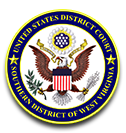Release from Custody
- General Requirements. Every bond must be executed by the defendant and principal obligor or one or more qualified sureties, if applicable, as provided in this rule.
- Corporate Sureties.
- A corporate surety must be qualified to write bonds under 31 U.S.C. §§ 9301–9309 and approved by the Secretary of the Treasury of the United States.
- The representative of the corporate surety that signs the bond must attach to the bond a power of attorney that establishes the representative’s authority to bind the corporate surety.
- Real-Property Bond.
- A person may serve as a surety on a real-property bond only by court order. A person seeking permission to serve as a surety on a real property bond must:
- offer as security real property located in the State of West Virginia, or other property as approved by a judge of this court, of an unencumbered value equal to or greater than the stated amount of the bond;
- be competent to convey the real property; and
- submit an affidavit and supporting documents including: (i) a legal description of the real property; (ii) a complete list of all encumbrances and liens on the real property; (iii) a current appraisal of the real property by a qualified appraiser; (iv) a waiver of inchoate rights; (v) a certification that the real property is not exempt from execution; and (vi) proof of payment of property taxes.
- Within 14 days after the court approves the real-property bond, the surety must file with the court a copy of a notice of encumbrance filed by the surety with the county recorder or registrar of titles that identifies the bond as an encumbrance on the real property.
- A real-property bond will be released only by court order.
- A person may serve as a surety on a real-property bond only by court order. A person seeking permission to serve as a surety on a real property bond must:
- Cost Bonds. The court may, on motion or on its own, order a party to file a bond or other security for costs in an amount, and subject to conditions, specified by the court.
- Cash bonds. Deposit of cash bonds is governed by LR Civ P 67.1. Withdrawal of cash bonds is governed by LR Civ P 67.2.
- Personal Recognizance Bond. On a personal recognizance bond, the defendant promises to comply with all conditions imposed by the court. A defendant that fails to comply with a condition or fails to appear will be subject to penalties as authorized by statute.
- Objections. Any party may object to the issuance of a bond.
- All bonds must receive court approval.
